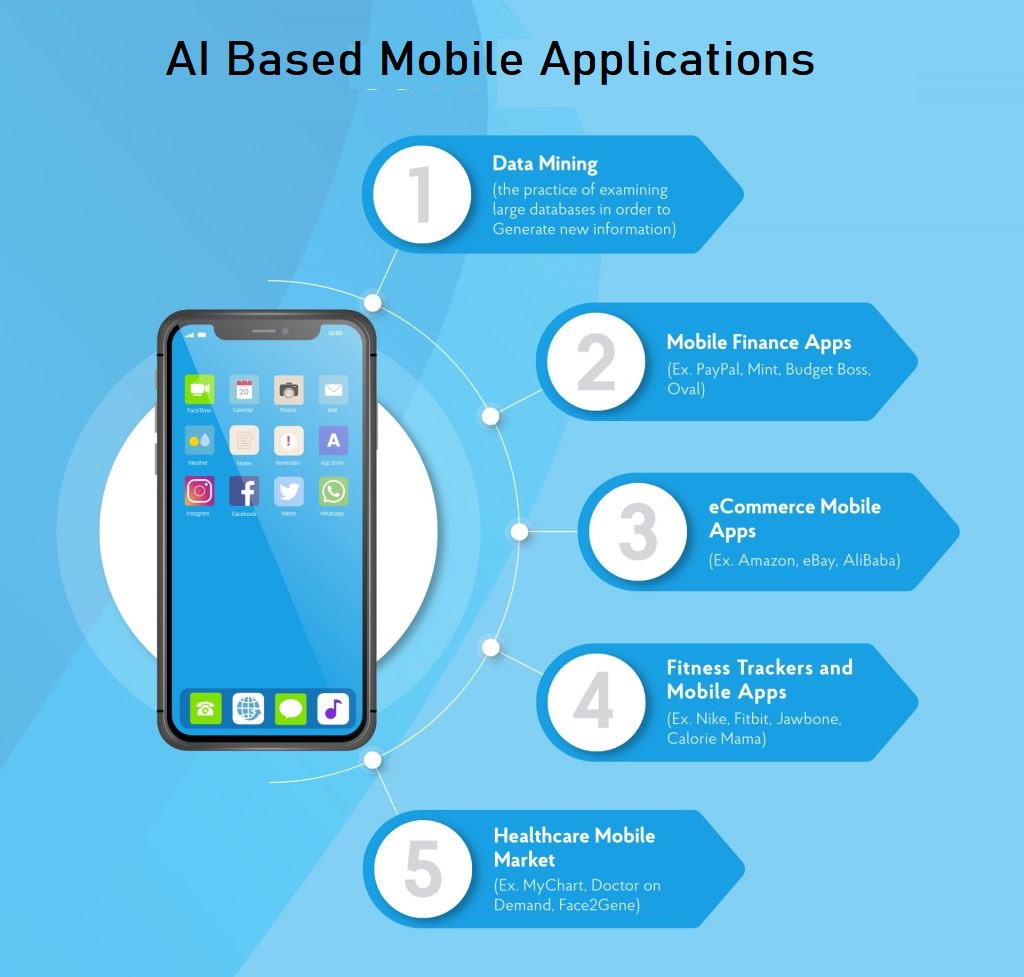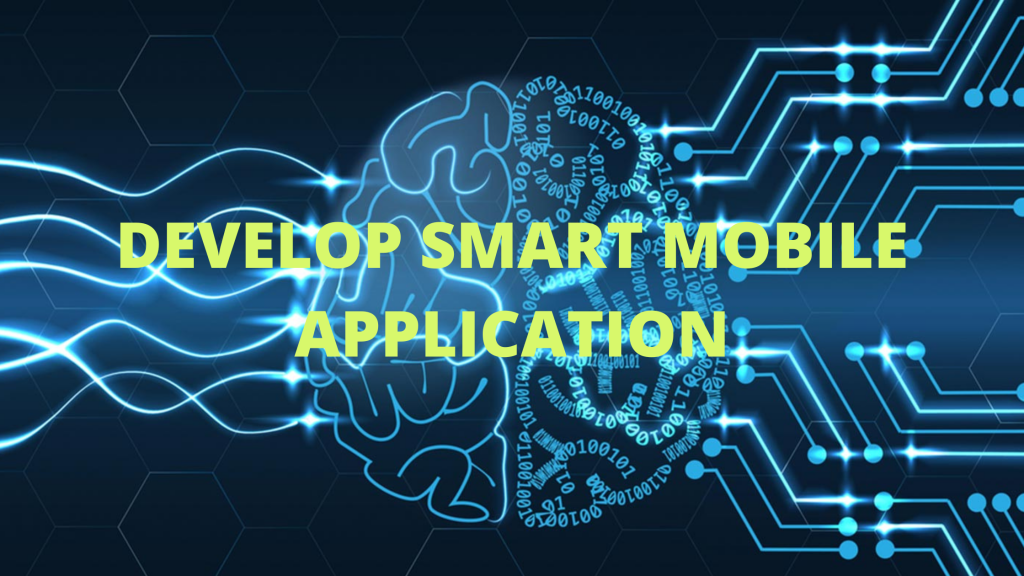In recent years, artificial intelligence (AI) has been gaining an incredible response across multiple digital mediums. Will ai in design be able to do what AI does to other several industry vertices?
It makes perfect sense to integrate AI in situations and cases that include massive data. It doesn’t matter whether it’s conversational chatbots, data analytics, or so on, this technology is useful for a variety of purposes given its flexibility and convenience.
Benefits of AI-Based Mobile Application
Mobile artificial intelligence will bring several benefits to companies that launch their apps product:
- Relevance and personalization. App users crave to feel unique to their individual tastes and have their specific needs satisfied via the technology they employ. AI mobile grants this opportunity by collecting and analyzing customer demographics, behavior, purchasing patterns and other relevant data to provide smartphone users with an extremely personalized experience offering a product or service that suits them to a tee.
- Comprehensive automation. Artificial intelligence apps enable high automation to handle similar assignments instead of dealing with each task via unique algorithms. For instance, ridesharing solutions leverage AI to plot the shortest course of the client to their destination by analyzing previous trips taken by drivers.
- Accuracy of user authentication. A set of algorithms of face recognition technology helps identify users in real-time by instantly searching databases of faces and matching them with faces that are identified in a scene. Artificial intelligence in mobile applications helps to get a very high rate of accuracy—about 99.5% accuracy rates. It makes the authorization process more secure and at the same time more simple for users, reducing the need for regular authentication forms and passwords on mobile apps.
- Customer engagement and retention. This benefit is crucial for business app owners who utilize AI algorithms to deeply engage customers and secure their market share by extending an entire gamut of incentives to clients and implicating them further into their brand’s ecosystem. AI-powered apps collect data from previous interactions with customers and serve as a benchmark for understanding their shopping behavior, enabling entrepreneurs to modify their engagement and retention strategy accordingly.
- Predictive marketing. The AI technology is second to none in tracking prevalent trends and anomalies in the niche to map out insights into the prospective market development and plan the organization’s business strategy correspondingly.
Seeing such unquestionable benefits, companies increasingly implement this technology into their products.

Use of Artificial Intelligence in Mobile Application
Here is a roster of AI-powered technologies that can take mobile apps to new functional heights.
1. Machine Learning
Machine Learning is likely to be the most popular artificial intelligence technology in IT. ML is the ability of computers and software products to take knowledgeable decisions and make conclusions learning from their past experience.
Such a capacity is achieved via two techniques. First, the supervised learning model is honed to forecast future responses to fresh data by analyzing historical inputs and outputs. Unsupervised learning works only with the input information discovering persistent patterns ( a.k.a. clustering). Whatever ML strategy is chosen, it opens broad vistas for implementing them into apps used in various industries—from education and healthcare to sales and manufacturing.
An example of ML-driven artificial intelligence in mobile apps is a fintech solution called Oval. This app analyzes the spending habits of all users to draw a personalized saving strategy for each customer. Moreover, being a machine learning brainchild, this app improves with each new data set users to enter into it to yield more competent advice.
2. Speech Recognition
People today like not only to talk ON the smartphone but actually talk TO the phone. Equipping devices with CUI (Conversational User Interface) makes them intelligent enough to obey voice orders and understand human speech by converting it into a format that machines can comprehend. This AI know-how has given rise to virtual assistants like Siri or Cortana that “live” inside our gadgets and help owners who ask them to find a parking space, play their favorite song, make restaurant reservations and do lots of other errands.
Besides providing a comfortable UX for most users, voice recognition apps are indispensable for visually disadvantaged people who get a chance to interact with their smartphones without actually seeing the screen.
3. Natural Speech Synthesis
Speech synthesis technology enables AI in your mobile device to speak to you as well. Yet, in fact, your gadget not so much communicates with you as it reproduces aloud texts entered into it. This service is rendered in Android-powered gizmos by the native feature with adjustable voice characteristics (speech rate and pitch) and an option of installing extra languages.
Yet, this bread-and-butter function can be significantly augmented with specialized apps that are quite numerous in the current IT market. For instance, Narrator’s Voice not only reads texts from multiple sources but also has a wide choice of voices to reproduce the text and an option of adding sound effects to it (like gargle, echo or choir). Plus, the AI can run a text you wrote through the synthesizer (and save it as an MP3 file), making the app highly instrumental in voiceover endeavors for presentations and slideshows.
4. Chatbots
Making a mobile app a part of your brand necessitates automating a fair share of interactions with customers. And this is where chatbots step in, relieving your personnel of tedious tasks like helping clients fill out a feedback form or responding to their typical inquiries. This kind of AI-fueled app is now becoming a must-have for smaller companies, whereas all behemoths in the world of business (Apple, Amazon, Microsoft, IBM) employ chatbot technology on a large scale.
5. Image Recognition
Being able to recognize and classify the object in a picture or video is what only humans could do until recently. Today, AI apps do that with greater accuracy, and this ability finds numerous applications in various fields—from identifying license plates of traffic regulations’ perpetrators to monitoring the quality of products in high-precision manufacturing.
One of such apps is Calorie Mama which helps people to control the number of calories they consume by analyzing photos of meals. Moreover, adding new pictures to the database makes nutrition estimates more accurate over time.
6. Text Recognition
Sometimes, you may need to extract letters or numbers (or even a big text chunk) from an image to be typed and used for your purposes. Optical character recognition (OCR) apps are here to help you in this previously impossible mission. One of the most popular among them is Google Keep, which captures text from pictures and saves it in digital format so that you don’t have to type anything manually and can delete the image entirely to be left only with characters.
7. Biometrics
The AI-powered mechanisms can recognize not only texts, images or human speech but also our physical parameters (face shape, body size, fingerprints) and gestures.
Mainly being employed in marketing, this technology can be leveraged in other industries as well. For example, banks, correctional facilities, and educational establishments can benefit from utilizing this software.
For instance, Face2Gene is a highly specialized app meant for clinicians and helping them to diagnose genetic disorders. It is honed to analyze patients’ faces, giving instant feedback and enabling healthcare providers to share results in closed group forums.
8. Emotion and Sentiment Analysis
This is the elaboration of the previous technology but focuses on identifying a person’s emotions. Body language, vocal fluctuations, and facial expressions are telltale signs that are key to recognizing a person’s emotions. Reading them is helpful to assess consumer attitude to particular products or ads, gauge TV ratings or even identify malicious intent of people in airports, banks, stadiums, and other venues. The modern app market abounds in such products, with Face Reader by Noldus and Project Oxford by Microsoft being the ones worth mentioning.
Conclusion
Artificial Intelligence is making a robust advent into many digital products, making AI app development a cutting-edge high-tech domain nowadays. By commissioning a custom AI solution from Symphony Solutions, you will obtain a high-end mobile app that will impress you with its seamless operation and perfect UI design.




